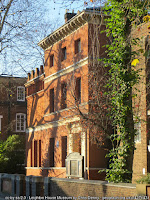"People are not stupid. They can laugh at all kinds of things without taking it home and into reality. I perform in front of generally intelligent audiences, and they get the stuff. They don’t go home and smash things up, do they?" Jerry Sadowitz talks to the Guardian about being the experience of being cancelled by his Edinburgh fringe venue.
"Homer, a high-school graduate whose union job at the nuclear-power plant required little technical skill, supported a family of five. A home, a car, food, regular doctor’s appointments, and enough left over for plenty of beer at the local bar were all attainable on a single working-class salary." Dani Alexis Ryskamp argues that the existence enjoyed by the Simpsons when the series launched in 1989 is now out of the reach of many Americans.
"From 1979 to 1985, Norwich was home to the largest squat in Europe: the Argyle Street Alternative Republic ... Around 60 terraced council houses were occupied by hippies, bikers, Bolsheviks, and wanderers of every stripe." Damien, a former resident of the Republic, remembers how it was broken up by the authorities.
Rachel Cook celebrates the reopening of Leighton House in Holland Park, the home of the Victorian painter Frederic Leighton.
Graham McCann surveys the rise and fall of Don Estelle: "There he was, one of the stars of a BBC sitcom that was attracting audiences of up to 17 million viewers, as well as sharing the spotlight on multiple editions of Top of the Pops with the likes of Paul McCartney and Wings, the Bay City Rollers, 10cc, Art Garfunkel, Barry White and Eric Clapton, and making lucrative personal appearances all over the country, often in the company of his co-star and musical sidekick, Windsor Davies."

No comments:
Post a Comment